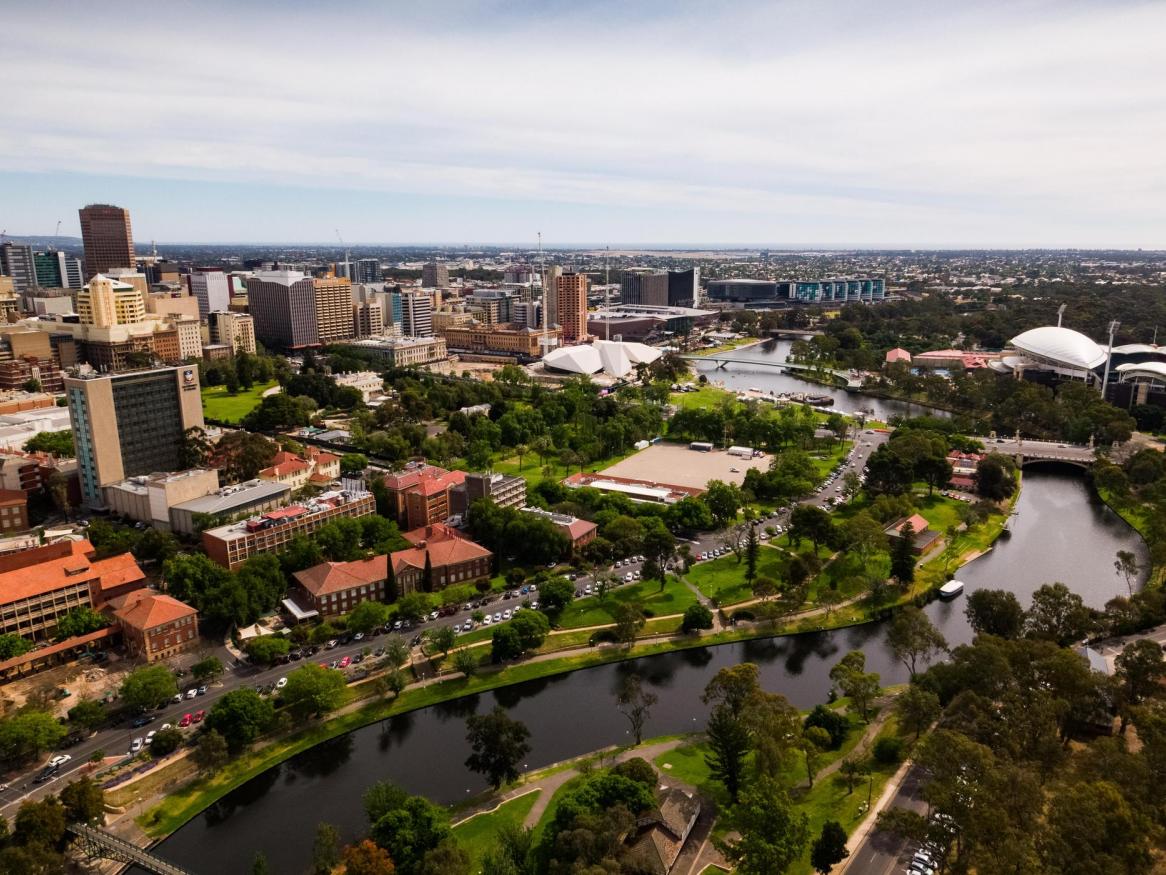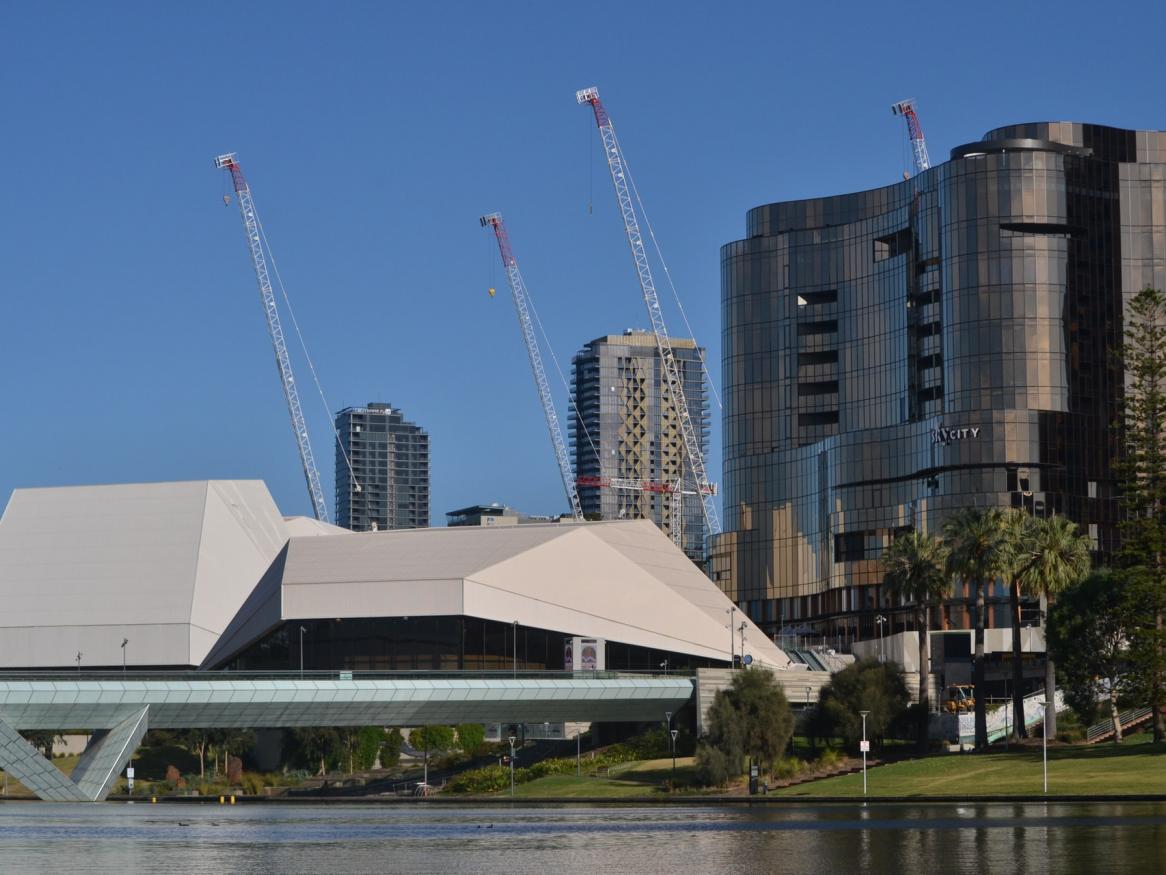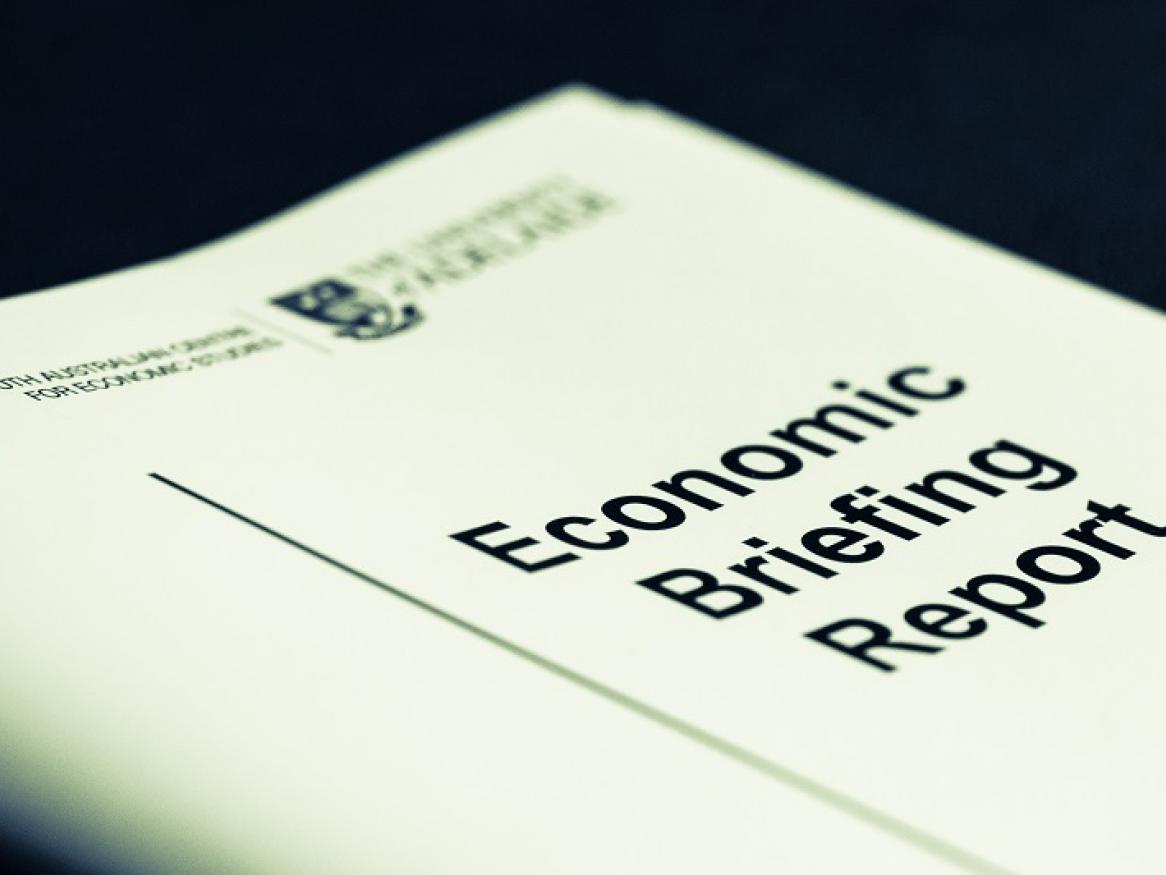Economic Policy Forum
The purpose of the blog is to provide a central source of information on the South Australian economy. In addition to providing updates on the latest economic data released for South Australia, the blog provides commentary on economic and social issues of relevance to South Australia and Australia, information on upcoming events, and insights into the latest research undertaken by SACES.
Latest from the Economic policy forum
Subdued growth for SA, while cost of living crisis eases
South Australia's economy grew weakly in 2023/24 due to capacity constraints and subdued household spending, according to the latest SACES Economic Briefing Report from SACES. While the labour market remained resilient with low unemployment, households faced severe cost-of-living pressures, with real per capita disposable incomes declining for a second consecutive year. Looking ahead, a modest recovery in household spending and easing inflation are expected, but challenges like a smaller winter grain crop and global trade risks may dampen growth prospects.
Read more about Subdued growth for SA, while cost of living crisis easesSA’s labour force participation likely to worsen
Current pressures on South Australia’s labour force and housing markets are likely to worsen over the next few decades due to the rapid ageing of the population, according to economists from the University of Adelaide’s SA Centre for Economic Studies (SACES).
Read more about SA’s labour force participation likely to worsenSignificant slowdown in economy amidst weak spending
The South Australian economy has lost momentum over the past six months with key economic indicators showing weaker trends, according to the latest Economic Briefing Report from the SA Centre for Economic Studies.
Read more about Significant slowdown in economy amidst weak spendingRecord decline in purchasing power for SA households
South Australian households have experienced an unprecedented decline in their purchasing power over the past year. In our latest Economic Briefing Report, SACES estimates that households’ gross disposable incomes on a real per capita basis fell by around 7 per cent in 2022/23. Consequently, households are finding it increasingly difficult to sustain their spending levels. This situation will continue to suppress household spending in 2024, which will lead to a slowdown in South Australia’s economic growth next year.
Read more about Record decline in purchasing power for SA householdsDemography not policy may dictate which SA job sectors grow
A new report from the SA Centre for Economic Studies suggests that South Australia’s healthcare sector may experience the biggest growth in employment in the state, in the near future. The demand for people in this sector will create problems for others sectors such as defence that will be competing for scarce skilled labour.
Read more about Demography not policy may dictate which SA job sectors growSA household spending loses momentum as cost-of-living weighs heavy
Aggregate spending in South Australia has lost momentum over the past year as cost of living issues have weighed on household spending. Nonetheless, the State has enjoyed an especially strong recovery from the pandemic, and many areas of the economy are now operating at very high levels of capacity. These conclusions are contained in the latest Economic Briefing Report from the SA Centre for Economic Studies.
Read more about SA household spending loses momentum as cost-of-living weighs heavySA economic growth to moderate as headwinds intensify and capacity constraints are reached
The latest Economic Briefing Report from the SA Centre for Economic Studies concludes that the SA economy will continue to expand in the new year, but at a slower pace. After two years of rapid growth, the state economy is now operating at a very high level of capacity utilisation with unemployment at low levels. Tighter financial conditions, cost of living pressures and high energy prices are all expected to have a dampening influence on growth in 2023.
Read more about SA economic growth to moderate as headwinds intensify and capacity constraints are reachedMitigating work related financial disincentives faced by Age Pensioners can help address the skills shortage
Raising the labour force participation of Age Pensioners would help to address existing skills shortages within Australia. A new research paper from SACES examines a potential policy reform to address the current financial disincentive to participate in the labour force faced by those on the Aged Pension.
Read more about Mitigating work related financial disincentives faced by Age Pensioners can help address the skills shortageSA economic recovery to continue despite cost of living crisis
South Australia’s economic recovery is set to continue despite inflation and rising interest rates putting increased strain on household budgets. But with household and public sector consumption expected to weaken, the State’s export performance will need to improve to compensate. These conclusions are contained in the latest Economic Briefing Report from the SA Centre for Economic Studies.
Read more about SA economic recovery to continue despite cost of living crisisSA construction sector remains strong, but faces headwinds
Overall activity in the South Australian construction sector should remain at its current robust level over the near term. But recent large price increases for inputs and the gradual erosion of recent supportive factors will present near and medium-term challenges for the construction sector, especially residential building. These insights are contained in a newly released paper from SACES which assesses the state of general business conditions in the construction industry in South Australia.
Read more about SA construction sector remains strong, but faces headwindsSA economic recovery to continue but reopening no guarantee of economic windfall
South Australia’s economic recovery is expected to continue well into the new year. Recent strong growth in business investment, a backlog of construction work, and reopening of borders will support the ongoing recovery. But the economic benefits of reopening will be diminished to the extent that it leads to fresh COVID outbreaks and voluntary social distancing.
Read more about SA economic recovery to continue but reopening no guarantee of economic windfallEducation can mitigate COVID-19 employment shocks
A new research paper from SACES which examines the impact of COVID-19 on employment in South Australia with particular reference to the young argues that more support for education and training is the key to offsetting the employment impacts of similar shocks.
Read more about Education can mitigate COVID-19 employment shocksBusiness tool reduces risk of implementing AI tech
Artificial intelligence (AI) is increasingly being embraced by Australian businesses to enhance their business operations. While the economic and societal risks of AI have received considerable attention, there is less appreciation for the potential Work Health and Safety (WHS) risks posed by AI use in the workplace. As part of a collaborative research project SACES has investigated the potential WHS risks of AI and helped develop a risk management tool to help companies manage potential workplace health and safety risks related to the introduction of AI technology.
Read more about Business tool reduces risk of implementing AI techPolicy support offers opportunities for SA post pandemic
Policy support from the South Australian and Federal governments for employment and training initiatives could play a crucial role in boosting the State’s population and recovery from the impact of the COVID-19 pandemic, according to the University of Adelaide’s SA Centre for Economic Studies. These conclusions are drawn from three policy papers which consider the demographic and labour market impacts of COVID-19 on South Australia.
Read more about Policy support offers opportunities for SA post pandemicVale Professor Cliff Walsh
The staff of the South Australian Centre for Economic Studies (SACES) would like to acknowledge the passing of Emeritus Professor Cliff Walsh on the evening of the 7th of July in Melbourne.
Read more about Vale Professor Cliff WalshSlow vaccine roll-out could deepen economic scars
In their latest Economic Briefing Report, economists from the SA Centre for Economic Studies (SACES) conclude that while South Australia’s economy is recovering strongly, the slow vaccine roll-out is a significant threat to the nation’s ongoing ability to weather the long-term effects of the pandemic. They also warn that Australia needs to raise the standards of governance at all levels in order to deal with increasing economic, political, and environmental threats.
Read more about Slow vaccine roll-out could deepen economic scarsNot wiped out. Even after the collapse of Greensill, there's time to save Whyalla
Maintaining existing steel operations will not be sufficient to ensure the economic prosperity of Whyalla going forward. In this opinion piece, Michael O'Neil argues that a strategic approach to diversifying the local economy, driven by local action, is required to alter Whyalla’s economic destiny.
Read more about Not wiped out. Even after the collapse of Greensill, there's time to save WhyallaArtificial intelligence revolution offers benefits and challenges
Artificial intelligence (AI) is the subject of much, and sometimes fantastical, speculation. However, the development of powerful mathematical models and increasing computer power have combined to make AI economically useful for a wide range of tasks, and companies report that the adoption of AI has delivered improvements in sales and efficiency. In an Issues Paper just released by SACES, the Australian Institute of Machine Learning argues that AI has reached a global tipping point and that Australia needs to invest in research and development in order to take advantage of this next wave of automation. Australia urgently needs a formal, national strategy for AI to ensure that we are net beneficiaries and not simply powerless recipients of this new and potentially disruptive technology.
Read more about Artificial intelligence revolution offers benefits and challengesGreater COVID-19 consultation needed to avoid economic losses
The SA Centre for Economic Studies (SACES) is urging the State Government to consider a more consultative approach with industry in its response to the COVID-19 pandemic to avoid disruption and losses to the hotel sector. This recommendation is informed by a survey of the hotel industry in South Australia to gauge the impact of the sudden lockdown of South Australia due to COVID-19 in November 2020.
Read more about Greater COVID-19 consultation needed to avoid economic lossesChina tariffs will hinder SA economic recovery
University of Adelaide economists expect the South Australian economy will continue to bounce back in 2020/21. However, economic recovery will be weaker than previously thought as a consequence of China’s decision to escalate its trade war with Australia, the outbreak of a second COVID-19 wave in the northern hemisphere, and South Australia’s own mini lockdown in November.
Read more about China tariffs will hinder SA economic recoveryCOVID-19 will change more than our health
The social isolation that is central to curbing the spread of the COVID virus has implications for the short- and long-term nature of workplaces, and society more generally, the Deputy Chief Medical Officer, Professor Michael Kidd says.
Read more about COVID-19 will change more than our healthCould COVID-19 have a silver lining for South Australia?
SA could see a turnaround to a net migration inflow over the next two to three years as people are attracted by State’s positive health and lifestyle options, the Chair of the State Planning Commission, Michael Lennon, says.
Read more about Could COVID-19 have a silver lining for South Australia?COVID-19 should encourage new approach to development
Prominent developer, Theo Maras, says people’s desire to move closer to Adelaide’s CBD due to COVID-19 should see mixed-use development near, but not on, the parklands.
Read more about COVID-19 should encourage new approach to developmentInvesting in a post-pandemic future
The SA Centre for Economic Studies today launches a series of commentaries examining the implications of COVID-19. First up is Con Michalakis, CIO of Statewide Super, who proposes that local super funds should be invested in SA’s recovery.
Read more about Investing in a post-pandemic futureLong term employment trends across industries in Australia and lessons to learn from Australia’s past
Trends in employment in Australia have emerged over time across industries. These trends help us understand structural changes in the economy as well as how employment has been impacted by external and internal events over time, which industries are more vulnerable and which ones have recovered. In this post we examine how employment levels have evolved at the sectoral level at various intervals over the past 30 years.
Read more about Long term employment trends across industries in Australia and lessons to learn from Australia’s pastImproving outcomes for young people transitioning to the workforce
Young peoples’ job prospects and mental health have been hit particularly hard by the coronavirus pandemic. With the momentum changes wrought by COVID-19, now is a good time to re-examine how we transition young people to the labour market.
Read more about Improving outcomes for young people transitioning to the workforceRegional Blueprint for South Australia
A new Regional Blueprint produced by Regional Development South Australia provides a strategic reference document for identifying regional priorities and infrastructure needs.
Read more about Regional Blueprint for South AustraliaData Wrap - Job vacancies rebound strongly
In today’s Data Wrap we review the latest South Australian outcomes for retail sales, job vacancies, population growth and building approvals.
Read more about Data Wrap - Job vacancies rebound stronglyData Wrap - Job recovery continues but remains incomplete
In this edition of the Data Wrap we review the August Labour Force Survey results, and consider what the latest ABS data has to say about trends in employment by industry and residential property prices in Adelaide.
Read more about Data Wrap - Job recovery continues but remains incompleteSA economy will take years to recover from COVID-19
It will take years for the national and South Australian economies to return to full output and employment following the COVID-19 pandemic.
These conclusions are contained in the latest Economic Briefing Report prepared by University of Adelaide economists from the SA Centre for Economic Studies (SACES).
AI at Work: Tackling the work, health and safety ethics of artificial intelligence
Artificial intelligence (AI) is being increasingly deployed to drive innovation in products, production processes and service delivery. However, adoption of AI carries potential risks for workplaces and their clientele, including the potential loss of human life, with workplace health and safety implications. SACES, along with AIML and AITI, are hosting an open workshop to discuss and gain an understanding of the key ethical considerations for business in adopting AI technologies.
Read more about Tackling the work, health and safety ethics of artificial intelligence






























